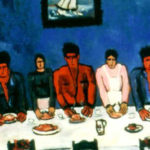We run our website the way we wished the whole internet worked: we provide high quality original content with no ads. We are funded solely by your direct support. Please consider supporting this project.

Listen and Learn: A First Step Toward Reconciliation
Jesus Christ is not just the Lord, Savior and Messiah of the Jews: he is the Lord, Savior and Messiah of all people. Through Christ a kingdom is being established that tears down tribal walls between races and re-unites and reconciles people together in the love God.
Paul makes the point most forcefully. In Ephesians Paul writes that the Gentiles who were once outside the covenant of God “have been brought near by the blood of Christ.” He then continues,
For he himself is our peace, who has made the two [Jew and Gentile] one and has destroyed the barrier, the dividing wall of hostility…His purpose was to create in himself one new humanity out of the two, thus making peace, and in one body to reconcile both of them to God through the cross, by which he put to death their hostility (Eph 2:14-16).
This is a breathtaking teaching! The most fundamental ethnic divide in the ancient world, at least from a Jewish perspective, was the divide between Jews and Gentiles. But by his work on the cross, Paul is saying, Jesus has destroyed the “dividing wall of hostility” between these two groups—and by extension, all other hostile groups. Not only has Jesus brought peace to all previously hostile groups; he himself is the peace between all groups. For through his death Jesus has created “one new humanity.”
A key step in manifesting the “one new humanity” is for those in power to humbly acknowledge that they don’t know what they don’t know. In other words, the only way that whites can understand the systemic racism in our culture is to listen and learn from those who experience it. The only way that people like me can possibly learn about the privilege I experience as opposed to the lack of privilege that people of color experience is to actually listen to them.
So, for example, rather than normalizing our own (privileged) experience and thus denying that racial profiling exists—accusing all who claim otherwise of “playing the race card”—we who are white must humbly listen to and trust the experience of nonwhites whose experience suggest that it does.
We who are white need to cultivate relationships with nonwhites that are deep enough to allow us to “get on the inside” of a nonwhite experience of the world. Not only this, but where it is appropriate, we who are white need to submit to the leadership of nonwhites. Individuals, small groups, and predominately white churches must pursue these submitted relationships if we’re to make headway in manifesting “the one new humanity.”
This is frankly quite challenging for many whites, even for those who sincerely believe they want to be agents of reconciliation. Our privileged status has conditioned us to assume our perspectives are normative and to expect to have things our way. Because America was established by and for whites, nonwhites have to deal with our culture, but we don’t usually have to deal with theirs. The decision to listen, learn, and follow people of color requires whites to place themselves in a submitted position they aren’t accustomed to. But if the systematic racism that has characterized the American church throughout its history is going to be subverted, this is the first step that must be taken.
—Adapted from The Myth of a Christian Religion, pages 113-121
Photo credit: runran via Visualhunt.com / CC BY-SA
Category: General
Tags: Humility, Listening, Love, Racial Reconciliation
Topics: Ethical, Cultural and Political Issues
Related Reading

Podcast: How Much Hope Should We Have that We Can Find Unity Amid So Much Diversity?
Greg looks at Galatians 3:26-29. http://traffic.libsyn.com/askgregboyd/Episode_0370.mp3

From Good Friday to Easter
This weekend as you contemplate the suffering, death and resurrection of Jesus, we pray that God will reveal his unfathomable love for you in new ways. Blessings to all of you from all of us at ReKnew. Photo credit: Claudio via Visualhunt / CC BY

The Cruciform Center Part 2: How John’s Gospel Reveals a Cruciform God
In the previous post, we looked at how the Synoptics illustrate the centrality of the cross. While the Gospel of John varies in its structure and language from the Synoptics, the cross remains at the center. This centrality is expressed in a number of different ways. 1. The role that Jesus’ death plays in glorifying…

Sermon Clip: Extravagant Forgiveness, Extravagant Love
Greg Boyd had the wonderful opportunity to guest speak at a great church in Carlisle, PA called Carlisle BIC. He spoke on the topic of forgiveness and love. In this short clip, Greg describes how a prostitute was being judged by the Pharisees, but Jesus came to her rescue. You can listen to the full…

The Cruciform Trinity
As paradoxical as it sounds, if God is supremely revealed when he stoops to the infinite extremity of becoming his own antithesis on the cross, then we must conclude that stooping to this extremity out of love must, in some sense, be intrinsic to who God eternally is. And rendering this coherent necessitates that we…
